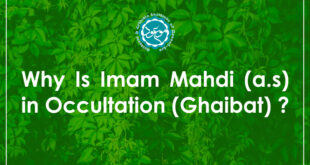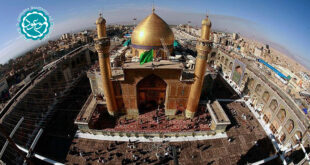Introduction
In the Name of Allah, the Beneficent, the Merciful
“Say: The unseen is only for Allah; therefore wait – surely I too, with you am of those who wait.” (20:Surah Yunus 10)
Almost twelve centuries have now passed from the sorrowful occultation of the Imam of the age (a.t.f.s.). Undoubtedly, this prolonged period shall continue until his advent. As certified by Imam Ridha (a.s.), the story of reappearance is like the story of the Day of Judgement since nobody save Allah is aware of its timing.1
Besides, it’s an onerous affair for the inhabitants of the earth and heavens that would not occur but all at once. Thus, inquiring into the timing of Imam’s advent is a futile task while awaiting his advent is our duty. Imam Javad (a.s.) says:
“Verily, the Qaem from us is the very Mahdi; that which is obligatory during his occultation is to await his coming and during his advent to obey his commands.”2
Awaiting (Entezar) means to have hope and expectation by heart of Imam’s advent, which springs from recognition and faith in his advent. Such an act carries numerous spiritual rewards and values.3 Like other forms of worship, awaiting (Entezar) enjoys practical qualitative dimensions such that our divine leaders have laid great emphasis and reckoned its observance as a duty and responsibility for the people during the period of occultation.
The writings that you have at hand are a selection of those very divine duties and responsibilities, which we have compiled for recalling and reminding ourselves about them. Of course, numerous scholars and researchers have expressed this matter very beautifully and eloquently, thus leaving behind invaluable effects to their credit.
We hope every one of us ponders upon the duties that we have before the Imam of the age (a.s.) and by acting upon them we attract his holy grace and favour and have a share, though a little, in preparing the ground for Imam’s advent.
Ali Akbar Thalafi,
28 Jamadi al-Thani 1417
1. Kamaluddin; 2/373
2. Kamaluddin; 2/377
3.Refer to Kamaluddin 2/644-647 & Nur-al Absar Fi Fazilat-ul-Entezar/15-23.
Recognition of Imam of the Age
In the Ahl al-bayt (a.s.) school, it is fixed that the land has never been, and shall never be void of a divine hujjah (proof) and leader and the people of every era are duty-bound to recognize such a leader appointed by God and not to deny him. Uthman-ibn-Saeed Amri who held representation for Imam Hadi, Imam Askari and Imam Mahdi (a.s.) says:
“I was in the presence of Abu Muhammad Hasan-ibn-Ali (a.s.). He was inquired about the hadith narrated from his forefathers that the land would never remain void of Allah’s plea until the Day of Judgement and anyone who dies and does not recognize the Imam of his time has died the death of ignorance.”
In reply, Imam (a.s.) said:
“This is the true just as daylight is true.”
They said:
“O the offspring of the Messenger of Allah. Who is the Hujjah and Imam after you?”
He (a.s.) replied:
“He is my son Muhammad. He is the Imam and Hujjah after me. Anyone who dies and does not recognize him has died the death of ignorance.”1
As certified by Imam Sadiq (a.s.), the death of ignorance refers to the very death while having strayed and deviated.2
Recognition of Imam of the age (a.t.f.s.) holds importance from two aspects: ancestral and noble birth. A Shia should know who Imam’s forefathers are and what status and dignity he holds. By this recognition, the true claimant is distinguished from the false ones and nobody will have the least doubt at any time.
About acquaintance with Imam of the Age (a.t.f.s.), the Holy Messenger of Allah (s.a.w.a.) and the Imams (a.s.) have narrated numerous traditions that have come down in independent books. For instance, Shaikh Tusi has narrated them in the book “Al-Ghaibah”, Shaikh Nu’mani in “Al-Ghaibah” and Shaikh Saduq in“Kamaluddin.” Sadr-ul-Islam, Hamadani says: During the current era, it is obligatory for all believing men and women and every Muslim to have a few copies of these books in Arabic and Persian languages in their houses for their reference.3
1.Kamaluddin; 2/409& Kifayatul-Athar/292.
2.Al-Kafi; 1/376
3.Takaleef al-Anam/269
Following the Imam of the Age
Acting upon the rules and etiquettes of Imam (a.t.f.s.) is among the vital dimensions of ‘Awaiting’ (Entezar). Anyone calling himself a Shia should please Imam (a.t.f.s.) by this act and should strive in fulfilling his aims and aspirations. Amir-ul-Mu’minin (a.s.) while seated on the pulpit of Kufa said:
“O Allah, verily, Thy land is helpless but to have a hujjah appointed by Thee for Thy creatures for guiding them towards Thy religion and teaching them Thy knowledge so that Thy proof (argument) is not rendered null and the followers of Thy saints (prophets) do not get deviated after having received guidance. This hujjah may be manifest and not obeyed or may be in hiding and in the state of waiting. If he goes in hiding at the time of guidance, then the believers set firm his holy knowledge and etiquette in the hearts and act upon them.”1
Imam Sadiq (a.s.) says:
“Truly, the master of this affair would go in hiding. So, (during that time) a slave should fear Allah and should safeguard his religion.”2
“Anyone wishing to be among the followers of the ‘Qaem’, should await his advent while at the same time keeps himself aloof from sins and adopts good ethics. If such a person dies before the ‘Qaem’s uprising, his reward will be like the reward of someone who has been in the presence of the ‘Qaem’.So strive hard and await his coming for you are a group upon whom is the mercy.”3
1. Kamaluddin; 1/302
2. Al-Kafi; 1/335 & 336; Ghaibah-Tusi/455 and Ghaibah-Nu’mani/169
3. Ghaibah-Nu’mani/200
 Mouood Mouood English Edition
Mouood Mouood English Edition




